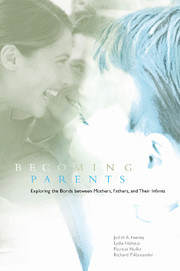Book contents
- Frontmatter
- Contents
- Preface
- 1 The Transition to Parenthood
- 2 Attachment in Childhood and Beyond
- 3 The Study
- 4 The Couples
- 5 Pregnancy and Plans for Birth
- 6 Couples' Experiences of Birth and New Parenthood
- 7 How Does New Parenthood Affect Couples?
- 8 Dealing with Depression
- 9 Men, Women, and Household Work: The Diaries
- 10 Couples' Changing Attachment Relationships
- 11 Six Months into Parenting
- 12 New Parenthood in Perspective
- Appendix A Core Questionnaires Completed by Couples
- Appendix B Summary of Sample Characteristics
- Appendix C Summary of Major Statistical Analyses
- References
- Author Index
- Subject Index
7 - How Does New Parenthood Affect Couples?
Published online by Cambridge University Press: 05 June 2012
- Frontmatter
- Contents
- Preface
- 1 The Transition to Parenthood
- 2 Attachment in Childhood and Beyond
- 3 The Study
- 4 The Couples
- 5 Pregnancy and Plans for Birth
- 6 Couples' Experiences of Birth and New Parenthood
- 7 How Does New Parenthood Affect Couples?
- 8 Dealing with Depression
- 9 Men, Women, and Household Work: The Diaries
- 10 Couples' Changing Attachment Relationships
- 11 Six Months into Parenting
- 12 New Parenthood in Perspective
- Appendix A Core Questionnaires Completed by Couples
- Appendix B Summary of Sample Characteristics
- Appendix C Summary of Major Statistical Analyses
- References
- Author Index
- Subject Index
Summary
“Forget the idea that baby and I are a team, or that I'm the boss. She's the leader. And the rules change all the time, and I'm not advised that they're going to be changed.”
At the second assessment, which took place about five months after the study began, both groups of couples again completed questionnaires reporting on their relationships and their general psychological adjustment. In addition, the new parents (whose babies were then about six weeks old) reported on the amount of stress associated with parenthood, and the strategies they were using to deal with the demands of parenting. In this chapter, we explore four aspects of these reports: changes occurring since the first assessment; overall differences between groups and genders; links between attachment security at the beginning of the study and current relationship quality and adjustment; and patterns of stress and coping among new parents.
CHANGES SINCE THE FIRST ASSESSMENT
A central issue in this longitudinal study was the extent to which the couples changed between the first and second assessments. We were interested in tracking any changes in their relationships, as well as in their psychological adjustment. Hence, at the second assessment, we examined responses to the core questionnaires that the couples had now completed twice: relationship satisfaction, attachment, caregiving, sexuality, and general psychological adjustment.
In looking at scores across the two assessments, we were particularly interested in measures on which the transition and comparison groups showed different patterns of change.
- Type
- Chapter
- Information
- Becoming ParentsExploring the Bonds between Mothers, Fathers, and their Infants, pp. 110 - 128Publisher: Cambridge University PressPrint publication year: 2001

